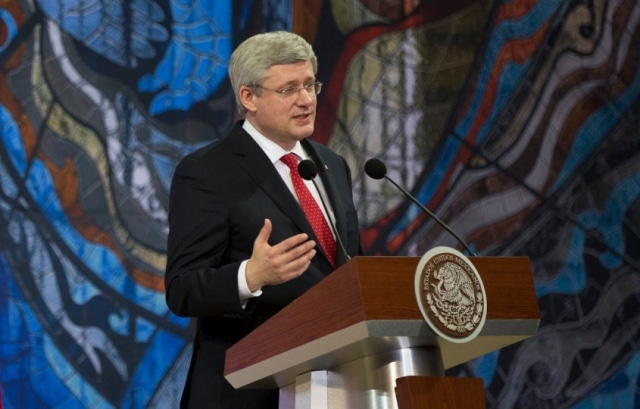This is a guest post by distinguished climatologist Michael Mann. The article originally appeared on The Mark News.
The scientific community has long warned that environmental issues, especially climate change, need to be a global concern. Climatologist Michael Mann argues that Canadian Prime Minister Stephen Harper’s administration is purposely obstructing the research that needs to take place to solve these problems.
In early 2013, the government of Canadian Prime Minister Stephen Harper introduced new science communications procedures that threatened the publication rights of an American scientist who had been working in the Arctic with Canadian researchers since 2003.
This was the first time the Canadian government’s draconian confidentiality rules had infringed on the scientific freedom of an international academic – or, at least, it was the first time such an incident had been made known. Professor Andreas Muenchow from the University of Delaware publicly refused to sign a government agreement that threatened to “sign away [his] freedom to speak, publish, educate, learn and share.”
To many of us American scientists, this episode sadly came as little surprise. We have known for some time that the Canadian government has been silencing the voices of scientists speaking out on the threat of fossil-fuel extraction and burning and the damaging impacts they are having on our climate. I have close friends in the Canadian scientific community who say they have personally been subjected to these heavy-handed policies. Why? Because the implications of their research are inconvenient to the powerful fossil-fuel interests that seem to now run the Canadian government.
This is really just a page from the George W. Bush administration’s playbook, used to muzzle government scientists in the United States only six years ago. In his book Censoring Science, for instance, Mark Bowen details the Bush administration’s efforts to silence James Hansen, then director and leading scientist of NASA’s Goddard Institute for Space Studies.
The Harper administration has made it clear that all research related to Canada’s Department of Fisheries and Oceans (DFO), even that conducted with the help of outside parties, is “deemed to be confidential.” According to its new policy, no involved party “may release such information to others in any way whatsoever without prior written authorization of the other party.” Silently released behind the doors of the DFO, the new protocol only came to light after an anonymous researcher published the document online.
The new restrictions constitute just one of many new protocols that the Harper government has introduced since 2006 that restrict the flow of scientific communication, not just in Canada, but within the global scientific community. And those rules are paired with severe monitoring and oversight of federal science employees.
Federal government handlers often chaperone Canada’s scientists at international scientific conferences, monitoring their public-speaking engagements and presentations and participating in interviews with the media to limit any unsanctioned chitchat. These policies are disturbingly reminiscent of the George W. Bush administration’s attempts to censor the views of U.S. government scientists speaking out on the threat of fossil-fuel burning and human-caused climate change.
Government interference in scientific research in Canada extends well beyond message control. Numerous scientific institutions and research stations across the country have been shuttered, including the world-famous Experimental Lakes Area (ELA), home to groundbreaking research on freshwater ecosystems and the effects that industrial pollutants have on them.
My own experiences at the center of the climate-change debate, which I’ve recounted in my book The Hockey Stick and the Climate Wars, began a decade and a half ago, when I published what is now popularly known as “the hockey-stick graph.” The graph clearly showed the unprecedented nature of the recent rise in temperature, and was a threat to entrenched fossil-fuel interests. That placed me in the crosshairs of industry front groups and hired guns that attempted to discredit the science by attacking individual scientists like myself.
Sadly, Canada is the latest front in the expanding battlefield, as Chris Turner indicates in his new book, The War on Science:
A war on science, after all, is ultimately a war on scientists … Canada has become a place where the best and brightest scientists are less and less likely to feel welcome … Who would want to work in an environment so anxious and chaotic, under an authority so arbitrary, for a nation so contemptuous [of] certain kinds of science that it seems to have all [but] reneged on its commitment to the Enlightenment itself?
The Harper government’s efforts to chill scientific discourse are part of a larger war on science conducted by well-funded special-interest groups that value short-term profit over the long-term public good. Recognizing this, it is important not only that Canadians fight back in an effort to restore the nation’s scientific integrity, but also that Americans, who understand all too well what is at stake, do all we can to support them in this battle.
Subscribe to our newsletter
Stay up to date with DeSmog news and alerts






